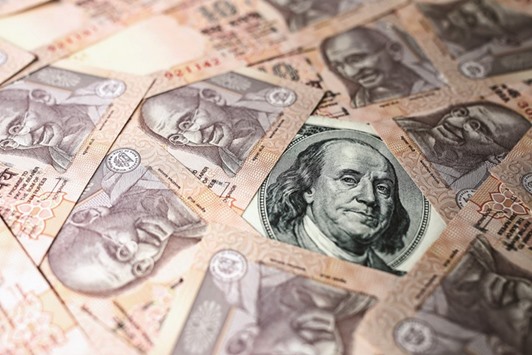Indian stocks declined for a second day and the currency weakened as renewed concern about the health of the global economy sparked a worldwide selloff.
Tata Consultancy Services and Infosys, the nation’s largest software exporters, were among the top losers on the benchmark gauge after Cognizant Technology Solutions Corp forecast lower than estimated revenue for the year. Maruti Suzuki India slid to a nine-month low as the Japanese yen reached its strongest since 2014. Dr Reddy’s Laboratories retreated after its third quarter profit and sales missed estimates.
The S&P BSE Sensex declined 1.1% at the close in Mumbai, extending Monday’s 1.3% tumble, as stock gauges in Japan and Australia plunged and US index futures were little changed amid concerns about slowing global economic growth. Local investors overlooked the government’s forecast of economic expansion this exceeding economists’ estimates this fiscal year as their focus shifted to the federal budget due on February 29.
“The GDP data is a positive in an otherwise gloomy scenario and the earnings growth is more or less been in line with estimates, but we don’t know what is going on in China and in the global economy and how much more pain is yet to be seen,” Gaurang Shah, vice president at Geojit BNP Paribas Financial Services, said in an interview to Bloomberg TV India. “It’s time to loosen your purse strings but buy gradually, not in one go.”
Japan’s Topix index sank 5.5%, falling the most since August 24, as banks and financial shares led losses. The Nikkei 225 Stock Average lost 5.4%, its biggest decline since June 2013.
The Standard & Poor’s 500 Index lost 1.4% Monday and the Nasdaq Composite Index approached a bear market. European equities added 0.2% after falling for six days in a row.
Overseas funds have pulled out $1.8bn from Indian equities since January 1, dragging the Sensex down 8% and making the rupee Asia’s worst-performing currency this year. They bought $3.3bn of shares last year, the smallest inflow since 2011, data compiled by Bloomberg show.
Tata Consultancy slid 3.5%, the most since October 14. Infosys plunged 3.8%, the steepest drop since November 18. Wipro fell 1.6%, while HCL Technologies retreated 4.6%. The S&P BSE Information Technology index tumbled the most since August, the worst performer among the 13 sectoral gauges compiled by the BSE.
Cognizant, the Teaneck, New Jersey-based company that pays more than a quarter of its costs in rupees, said on Monday it expects 2016 revenue to rise 10 to 14%, compared with consensus estimates of 14%, driven by unpredictable spending in healthcare and financial-services verticals. The stock tumbled the most since August 2014.
“Cognizant’s outlook indicates that demand revival from key customers such as banks, financial services and insurance companies will be delayed more than estimated,” Amar Mourya, an analyst with IndiaNivesh Securities said by phone. Maruti Suzuki decreased 2% as the yen strengthened past 115 per dollar for the first time in more than a year and rose against all its major peers. A stronger Japanese currency makes the imports of car parts expensive for Maruti.
Tata Motors tumbled 4% as deliveries of Jaguar Land Rover in North America climbed 9% in January compared with a 30% growth in December. The stock has declined 21% since Jan. 1, matching last year’s 20% loss.
Coal India, the world’s top producer, slid 4.4% in a second day of decline.
Dr Reddy’s lost 3.6% after it’s third-quarter group net income of Rs5.8bn missed the Rs6.5bn estimate of 25 analysts. Sun Pharmaceutical Industries added 2.2% and Lupin extended its three-day gain to 15%.
Meanwhile in the spot market, the rupee dropped as much as 0.4% before ending 0.1% higher at 67.9050 a dollar. It reversed losses as foreign banks were seen selling the greenback, two Mumbai-based traders said.
The currency has weakened 2.6% this year in Asia’s worst performance as global funds sold $1.8bn more local shares than they bought. DCB Bank expects the rupee to move in a range of 67.70-68.30 a dollar this week. Indian sovereign bonds were steady, with the yield on notes due May 2025 at 7.84%, according to prices from the central bank’s trading system. That on the new 10-year securities due 2026 rose one basis point to 7.74%.
A gauge of expected swings in India’s rupee climbed the most in almost a week as losses in local stocks deepened amid a worldwide selloff in equities.

A US dollar bill and Indian rupee banknotes are arranged for a photograph in Mumbai. The rupee closed up 0.1% at 67.9050 a dollar yesterday.
